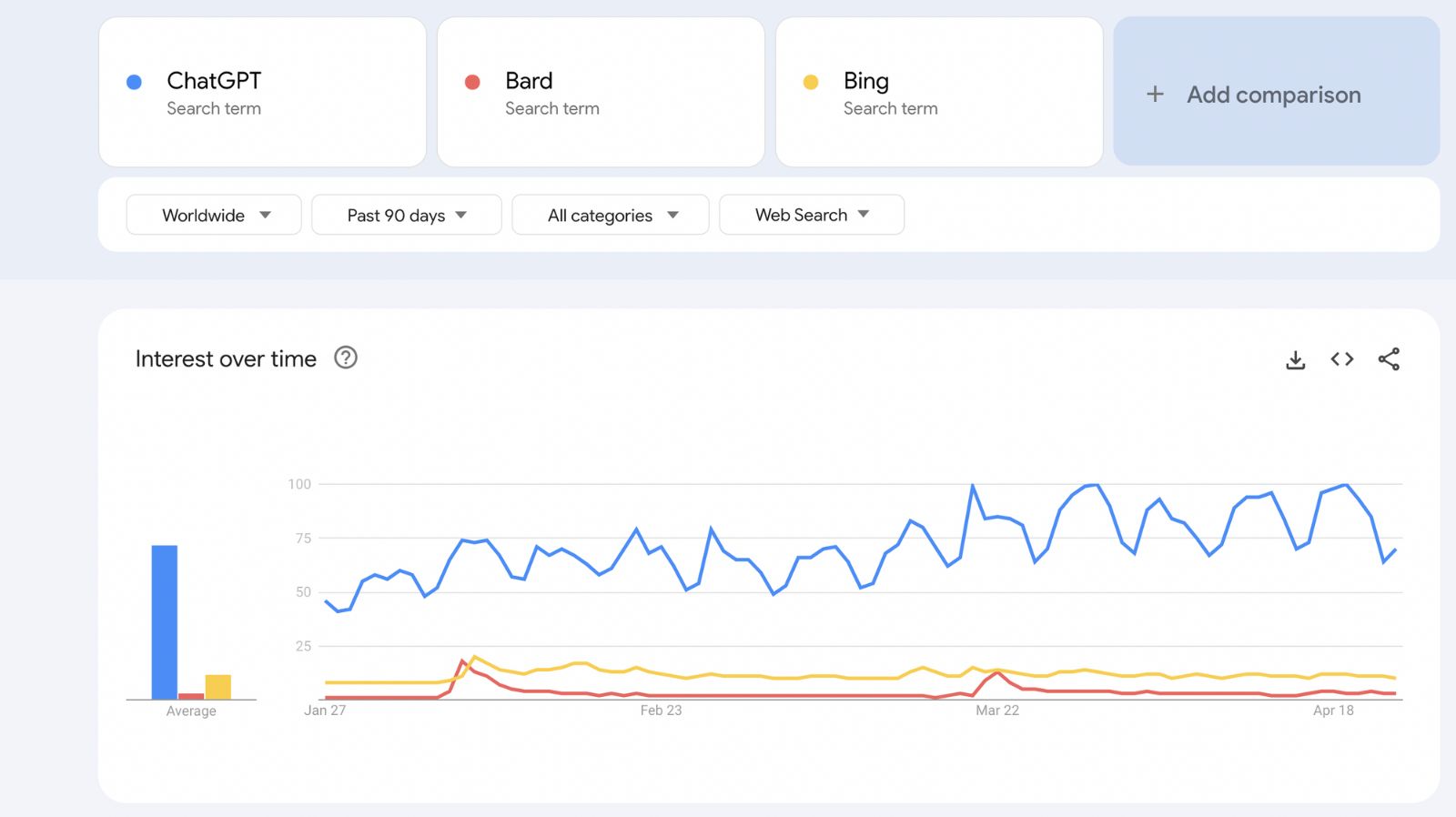- Item 1
- Item 2
- Item 3
- Item 4
ChatGPT Grows in Popularity as Bing and Bard Flatline
Google Trends data shows that as the AI arms race heats up, OpenAI's ChatGPT maintains its dominance, with Microsoft's Bing and Google's Bard slower to gain traction in the chatbot landscape.

Google Trends shows that ChatGPT has only grown in popularity as Bing and Bard search interest has flatlined. Screenshot by Artisana.
🧠 Stay Ahead of the Curve
OpenAI's ChatGPT dominates the chatbot landscape, while Microsoft's Bing and Google's Bard are slower to gain traction despite substantial investments.
This highlights the importance of quality answers and user satisfaction in AI chatbots, as numerous chatbots compete for mindshare.
The ongoing AI arms race between Microsoft and Google could have far-reaching implications for the future of AI-powered solutions and their impact on society.

April 27, 2023
Nearly three months after Microsoft launched its Bing chatbot and Google introduced Bard, OpenAI's ChatGPT remains the undisputed leader in mindshare. Google Trends data reveals that, despite buzzy launch events and deep news coverage, overall search interest in Bing and Bard has stagnated, while ChatGPT's relative interest continues to rise.
From a relative search interest perspective, ChatGPT is 8.3 times more popular than Microsoft Bing and 33 times more popular than Google's Bard.

High Stakes in the AI Arms Race
The stakes could not be higher at this moment. The AI competition between Google and Microsoft is intense, as both companies are heavily invested in integrating AI across their software ecosystems. Microsoft, which invested $10 billion in OpenAI in January on top of a $1 billion investment in 2019, has been using its strategic partnership with OpenAI as a strategic edge, using OpenAI’s sophisticated lead to power its own AI products.
Microsoft released its new Bing chatbot experience to the public in February, garnering largely positive reviews. Built on OpenAI's GPT-4 Large Language Model (LLM), the chatbot earned praise for its sophisticated responses. Kevin Roose, the New York Times' lead technology journalist, simultaneously commended and critiqued Bing, saying it "had replaced Google as my favorite search engine," but also noting that it left him "deeply unsettled, even frightened, by this A.I.'s emergent abilities."
Google's Bard chatbot, however, faced challenges from the start. Shares of Google's stock fell 8% in a single day after a preview video for Bard demonstrated the chatbot providing an incorrect answer to a question about the James Webb Space Telescope. Bard's launch in March received lukewarm reviews, with the Wall Street Journal calling it "boring" and Apple Insider stating it was "adequate, but Microsoft Bing blows it away."
Since Bard's troubled launch, Google has implemented corrective measures, such as consolidating its leading AI teams into a single unit called Google DeepMind and announcing numerous AI-powered features for its product suite. "You will see us be bold," CEO Sundar Pichai told the New York Times.
The Mindshare Disparity Challenge
While Google search trends are relative, and alternative explanations for Bing and Bard's lower interest, such as their native integration within their respective search engines, could exist, the magnitude of the difference in interest compared to OpenAI's ChatGPT is significant enough to demonstrate Bing and Bard's struggles to capture mindshare in the chatbot space.
The quality of answers appears to be a primary driver of ChatGPT's popularity. Many users strongly prefer OpenAI's GPT-4, citing its superior response quality compared to Microsoft and Google's more constrained chatbots.
Bard still sucks compared to GPT-4. It repeats my typos after me which doesn't show much understanding.. #BardAI #GPT4 pic.twitter.com/AegjRINvfz
— Space Monkey (@RealSpaceMonkey) April 25, 2023
Twitter user Random Thought Factory summarized their experience with all three chatbots, concluding that Bing "is great for internet searches and more up-to-date code," while ChatGPT "is great for complex requests." However, Google's Bard chatbot, they said, "falls short... it just doesn't compare."
Research
In Largest-Ever Turing Test, 1.5 Million Humans Guess Little Better Than ChanceJune 09, 2023
News
Leaked Google Memo Claiming “We Have No Moat, and Neither Does OpenAI” Shakes the AI WorldMay 05, 2023
Research
GPT AI Enables Scientists to Passively Decode Thoughts in Groundbreaking StudyMay 01, 2023
Research
GPT-4 Outperforms Elite Crowdworkers, Saving Researchers $500,000 and 20,000 hoursApril 11, 2023
Research
Generative Agents: Stanford's Groundbreaking AI Study Simulates Authentic Human BehaviorApril 10, 2023
Culture
As Online Users Increasingly Jailbreak ChatGPT in Creative Ways, Risks Abound for OpenAIMarch 27, 2023
